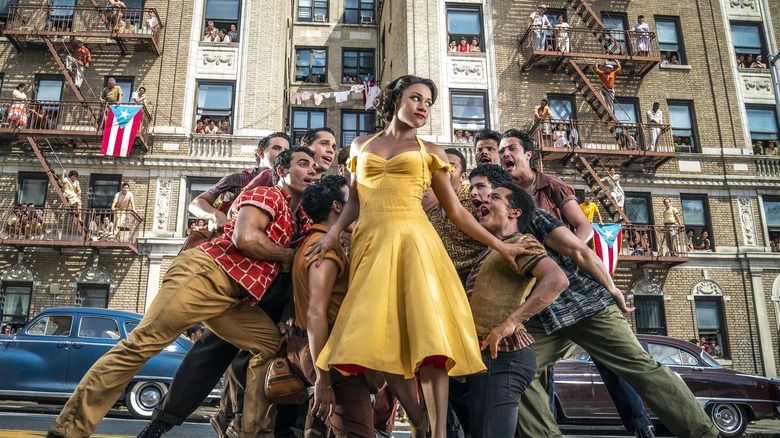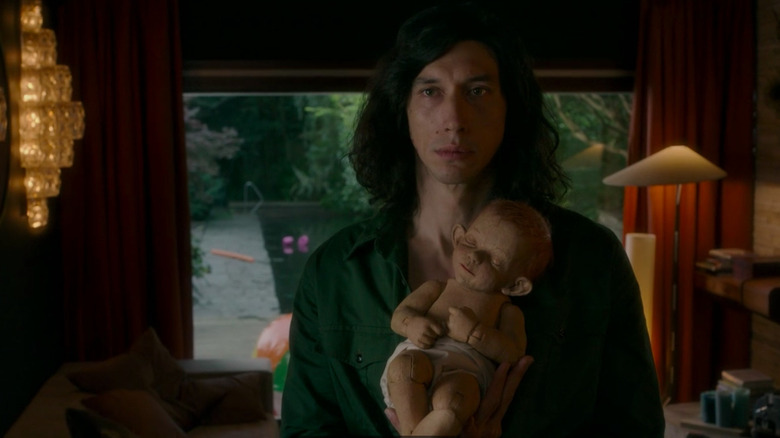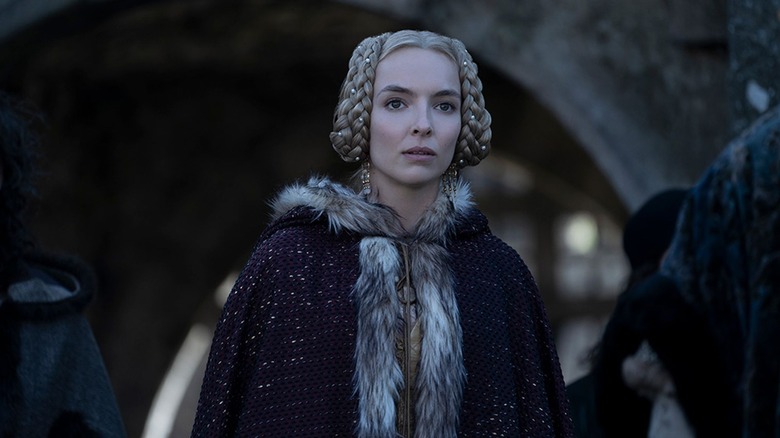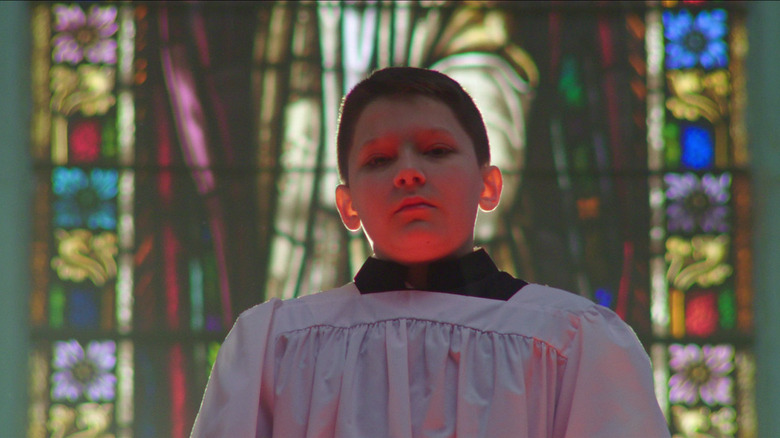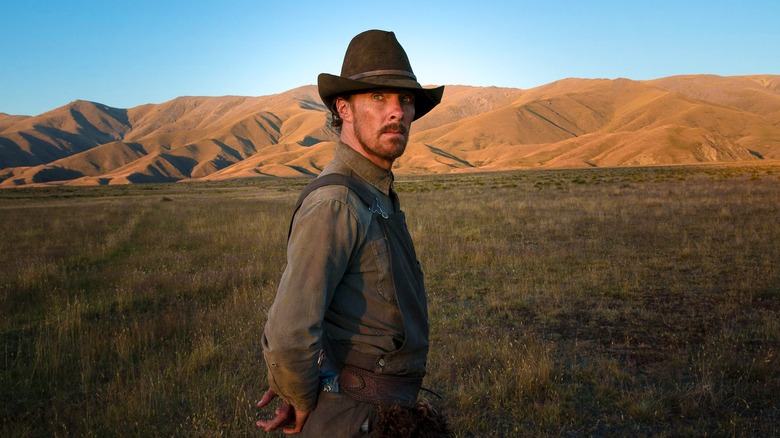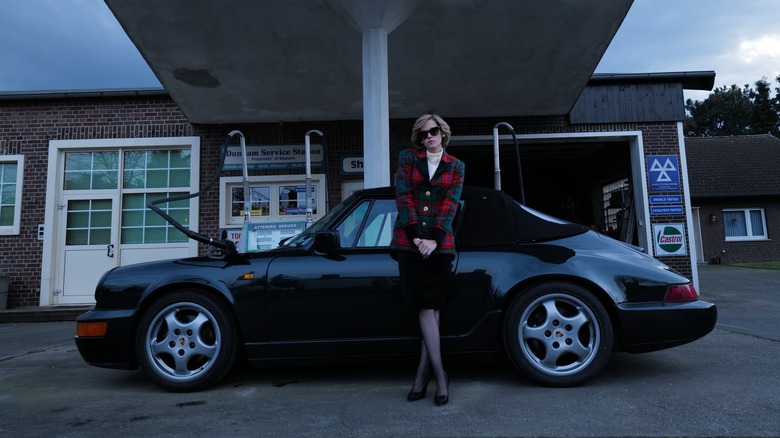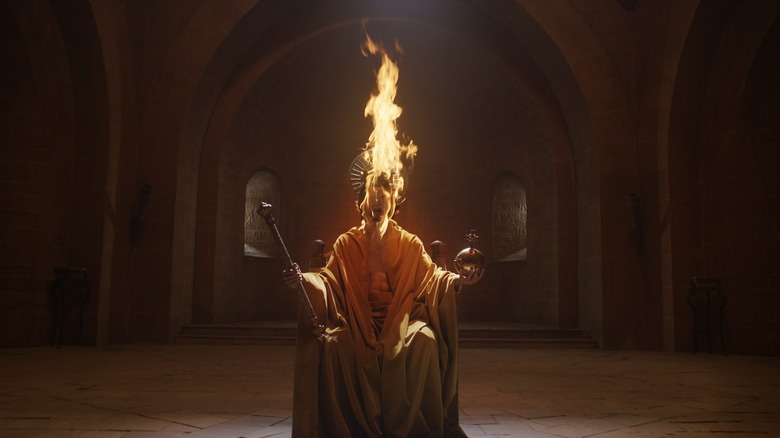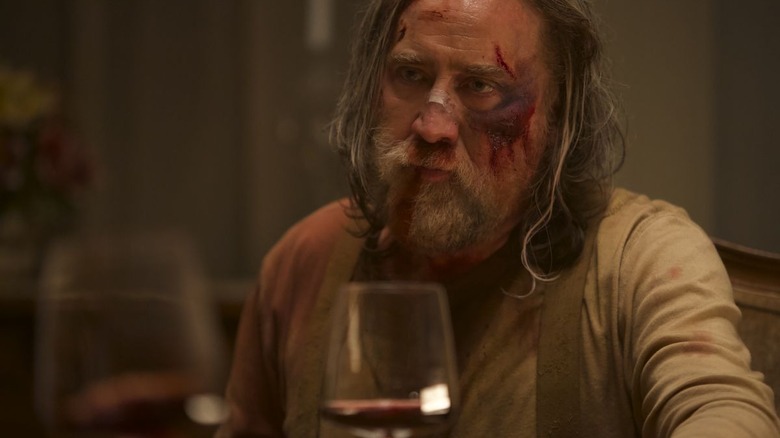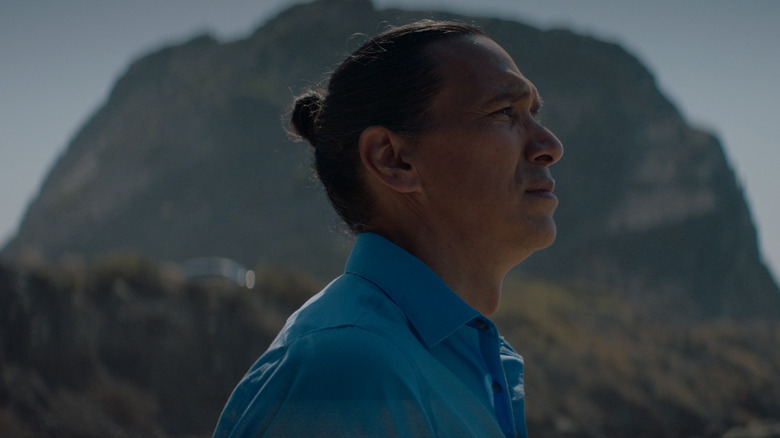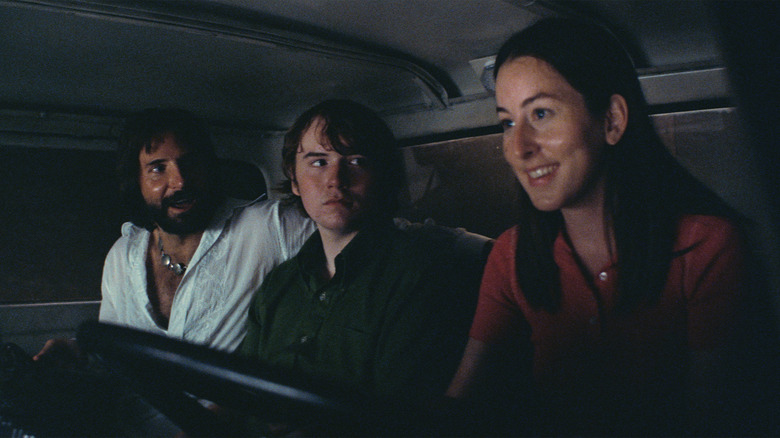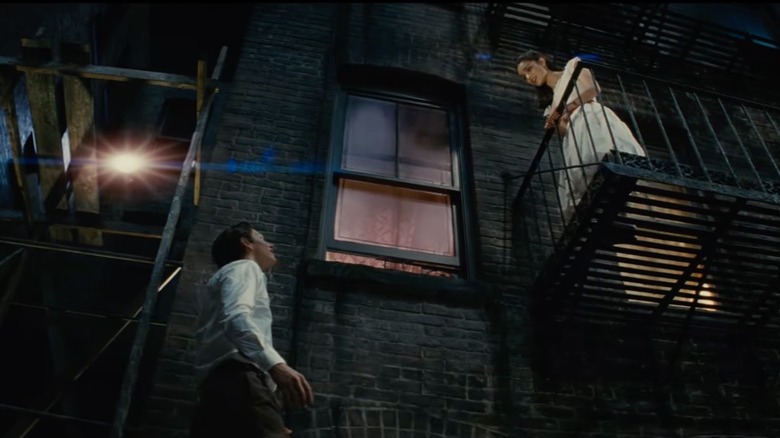Chris Evangelista's Top 10 Movies Of 2021
2021 already feels like a broken promise. After the nightmare that was 2020, we could be forgiven for hoping something better was on the horizon. But 2021 was a dumpster fire right out of the gate, kicking off immediately with a violent insurrection that threatened to toss the few remaining tattered shreds of American democracy to the wolves. Vaccines offered a glimmer of promise against a deadly pandemic, but variants emerged, while grifters and selfish ghouls who fancy themselves heroes continue to get in the way. And if all that weren't enough, there's still the ever-present threat of climate disaster — a disaster that some say might be already too late to reverse. In short, there's an apocalyptic vibe in the air that I have been unable to shake off, and all of that combined with the bad chemicals in my dumb brain have made the world a little extra gray lately. I wake up every day with a growing chasm in my heart; a place that once felt filled-up, but has now gone hollow.
But the movies remain.
But, yes, even the movie landscape has potential for bleakness. Studios hoping for audiences returning in droves to theaters got a rude awakening when it became clear that said audiences don't really want to flock to a multiplex right now unless the movie on the screen is big, big, big. And the definition of "big" varies. You would think that a big musical from a big director like Steven Friggin' Spielberg would've caught on. But no. Movie-goers had no use for it, instead preferring to see the umpteenth "Spider-Man" movie. And before we get off on the wrong foot, I'll say now that there's nothing wrong with wanting to see a new "Spider-Man" movie. But there is something wrong when only superhero stuff and big IP-based entertainment stand a chance at turning a profit. This sort of scenario sends a message to studios: invest harder in superheroes, forget everything else. Throw whatever's left onto streaming, maybe, and hope for the best.
Despite all this, 2021 was still awash in cinematic riches. I will continue to turn to the movies as long as they're still around, and still offering me a chance to enter the lives and worlds of wonderful, challenging, unique characters. I don't have much hope for the future, but I will continue to hold onto hope for the movies. And that brings us to my top 10 films of 2021. Films that truly sparked with me; that lingered long after the credits rolled. Films that lit a small spark in my chest; a spark that grew and burned like embers that eventually spread into full-force wildfires. There are times when I'm at my absolute lowest where it feels like the movies are all I really have.
I am bound by the traditional top 10 format here, but I wish I could go longer. I wish I could include the likes of Céline Sciamma's absolutely lovely "Petite Maman," or Apichatpong Weerasethakul's haunting "Memoria." I cannot let this pass without mentioning Ryusuke Hamaguchi's brilliant "Drive My Car," Theo Anthony's remarkable "All Light, Everywhere," or Mike Mills' wonderful "C'mon, C'mon." Without paying tribute to Wes Anderson's charming "The French Dispatch," or the heartwarming joys of Michael Rianda's "The Mitchells vs. the Machines." Stephen Karam's "The Humans," Jonas Poher Rasmussen's "Flee," Asghar Farhadi's "A Hero," Guillermo del Toro's "Nightmare Alley," Denis Villeneuve's "Dune," Lana Wachowski's "The Matrix Resurrections," James Wan's "Malignant," Maggie Gyllenhaal's "The Lost Daughter," Joel Coen's "The Tragedy of Macbeth," Paul Verhoeven's "Benedetta," Rebecca Hall's "Passing," Paul Schrader's "The Card Counter," and Guy Ritchie's "Wrath of Man." These titles may not be in my top 10, but they should not be ignored, or overlooked, or forgotten. And now, here are my top 10 films of 2021. See you at the movies.
10. Annette
"Now you have nothing to love."
Have you met Baby Annette? Leos Carax's odd, funny, and frequently bleak musical "Annette" befuddled many who saw it, even the Cannes premiere audience that should've eaten this thing up. I understand: this is a befuddling movie. But that's what gives "Annette" its power. Adam Driver is the world's worst stand-up comic, an angry, acidic creep who takes to the stage in a bathrobe and yells at his audience. His girlfriend is a world-famous opera singer, played by Marion Cotillard. Driver's character Henry McHenry is a beast while Cotillard's Ann Defrasnoux is much-loved, and no one can seem to figure out what drew these two polar opposites together.
Things take a turn when the couple has a baby — Annette, who is very clearly a puppet that seems to be alive, a fact that no one seems to care about. And as it turns out, Annette has inherited her mother's singing voice. Henry immediately sees dollar signs in his eyes and plans to put Annette up on the stage. And if anyone gets in his way, well, they're in trouble, because Henry is fully prepared to murder people to get ahead.
Annette features utterly strange songs by Sparks, songs that are sort of half-sung/half-spoken by a very game cast. Driver is phenomenal here, really leaning into how vile Henry McHenry is. But the real breakout is Simon Helberg, who is shockingly great playing a lovelorn conductor who gets roped into Henry's schemes for his own reasons. In any sane world, we'd be talking about Helberg in the Best Supporting Actor race at the Oscars.
Those in search of a traditional musical will come away from "Annette" confounded, but again: that's the film's power. Carax knows how absurd this all is, so much so that he sets up a big climactic sequence in which drones fly the Baby Annette puppet into a packed stadium for one last concert. If the sight of a puppet baby being flown around by drones fails to give you a weird burst of joy, I don't know what to tell you — maybe "Annette" isn't for you. But it is for me. Specifically, because it all ends with a devastating scene between Henry and Annette in which the two have a genuine, honest, and heartwrenching conversation. After all, Henry has done throughout the course of the film, he's left with a haunting reminder from Annette: "Now you have nothing to love."
9. The Last Duel
"The truth does not matter, there is only the power of men."
Ridley Scott still has it, and "The Last Duel," one of two films the 84-year-old filmmaker released in 2021, has him at the top of his game. Working with a clever script from Nicole Holofcener, Ben Affleck, and Matt Damon, Scott's "The Last Duel" is based on the true story of the final officially recognized judicial duel fought in France. The script takes a "Rashomon"-like approach, telling one story from three different perspectives. This enables Scott to employ subtle changes each time he comes back around to a familiar moment. Sometimes the simple act of moving the camera back a few inches completely alters a scene we thought we already had figured out.
It's the 1300s, and Jean de Carrouges (Matt Damon) is a knight who dreams of glory. But he's such a rude jerk that he alienates those around him, including the Count he serves, played by a scene-stealing Ben Affleck. Jean's only real friend is Jacques Le Gris (Adam Driver), but that friendship sours when Jean sees Jacques rising in stature. Things come to a horrifying head when Jean's wife, Marguerite de Carrouges (Jodie Comer), accuses Le Gris of rape. Le Gris, in turn, claims the encounter was consensual — but de Carrouges challenges his old friend to a duel to the death to sort things out. And the duel comes with dangers for Marguerite, too. If Jean loses the duel, it will legally mean that Le Gris is innocent — which would make Marguerite's accusation false. And a false accusation of rape is punishable by death.
This is heavy, challenging material, so it's perhaps not the biggest surprise that audiences didn't flock to "The Last Duel." But if they had they would've discovered an unexpectedly complex film; a film that challenges perspective, particularly that of men who see themselves as noble when they're anything but. The order of the character POV goes a long way towards tricking us and then making us question what we've assumed. When we first meet Damon's character, he's presented as a loving husband who genuinely cares about his wife. But when the story comes back around to the point of view of Comer's Marguerite, we see there's really not much that separates the cruelty of Damon and Driver's characters. They're both villains who see themselves as heroes. And Comer is the linchpin holding it all together, delivering a wrenching performance that deserved more attention.
8. Procession
"I want you to know I tried my best to tell your story."
There's no one making documentaries quite like Robert Greene ("Kate Plays Christine"). Greene's latest, "Procession," is truly unlike any doc I've seen before. That could just be a case of me needing to watch more documentaries, but I truly think Greene has struck upon something unique here. Unique, and emotionally devastating. In "Procession," six men who were sexually abused in childhood by Catholic priests come together with drama therapy, wherein participants engage in theatre techniques to work through their trauma.
The six men craft short films inspired by their experiences, and Greene shows us both those films and the work that goes into making them. The men are all very different, and while they share similar stories of abuse, the way they each confront that abuse is markedly different, and the short films they make run the gamut from catharsis to unbottled rage. As you might guess, none of this is easy to watch, but there is genuine hope here; and that hope coming via the creation of art makes "Procession" all the more powerful. The figures at the center of the film are taking the things that could have destroyed them and creating something wholly their own; something that can't be taken away.
7. The Power of the Dog
"'Deliver my soul from the sword; my darling from the power of the dog.'"
I think Benedict Cumberbatch is a good actor in general, but he's never been better than he is in Jane Campion's slow-burning neo-Western "The Power of the Dog." Cumberbatch is Phil Burbank, a brilliant guy with an Ivy League education who would rather play cowboy. He's wealthy and secure and probably doesn't need to work, but he does — as a cattle driver and ranch owner alongside his much quieter brother George (Jesse Plemons). Phil seems content with his rough-and-tumble life, romanticizing all the dirt and grime and sweat he encounters every day while wistfully remembering his late mentor, a figure known as Bronco Henry.
But Phil's entire existence is threatened when George marries a lonely widow, played by Kirsten Dunst, who doesn't have as flashy a role as Cumberbatch but still does fantastic work here. Phil loathes his new sister-in-law from the start for no real reason other than the fact that she's an outsider trespassing in his world. And when he shy, strange son Peter (Kodi Smit-McPhee) arrives to live with the family, Phil grows even more furious. But then ... a curious thing happens. Peter and Phil strike up an unlikely friendship — a friendship with undertones of something more; something unspoken but still clear as day.
Where is this all going? Campion, working from the novel by Thomas Savage, plays things extremely close to the vest here, and you might not entirely realize what "The Power of the Dog" is up to until its final moments. But that's a feature, not a bug, and it makes the film all the more incredible. Cumberbatch is the glue that holds it all together, playing Phil as a furious, hateful, threatening figure battling his own inner turmoil.
6. Spencer
"All I need is a miracle."
Subtext be damned! "Spencer" is a film that isn't afraid to hammer you over the head with obvious metaphors, and yet ... I don't think that hurts the film. Instead, it fits in with the overall tone of Pablo Larraín's unsettling fable based on one long holiday weekend from hell for Princess Diana. You can feel decay and rot lurking under all the ornate baubles and storied traditions that blanket the film; this is practically a horror movie, with Larraín borrowing heavily from Stanley Kubrick's take on Stephen King's "The Shining."
As the doomed Princess Di, Kristen Stewart once again proves that she's so much more than her lip-biting "Twilight" days. I've long said that Stewart is one of the most interesting actors working right now, and her performance in "Spencer" highlights that. Adopting a posh, breathy accent and never quite sitting still, Stewart plays Diana as a royal on the edge of the nervous breakdown. Hounded by the press and given the cold shoulder by her in-laws, Diana struggles to get through the Christmas holiday while struggling with her eating disorder, self-harm, nosy servants, and a few unquiet ghosts lurking around in the shadows.
Again: nothing here is subtle. But why should it be? We're watching Diana lose her mind; of course things are going to be explosive and broad. To Larraín's credit, while Diana's life is ultimately a tragedy, since we know her doomed fate, there's a hopefulness buried under all of this – the sense that Diana can still find some semblance of happiness even if her time is short. And layering it all is Jonny Greenwood's often nightmarish musical score, which sounds like it was ported over from a "Dracula" film (and that's not a complaint).
5. The Green Knight
"Is this really all there is?"
David Lowery's dark twisted fantasy may be an adaptation of the epic poem "Sir Gawain and the Green Knight," but it's truly indebted to Martin Scorsese's "The Last Temptation of Christ." Both films are about young men who fight tooth and nail to escape their destiny, only to realize in the end that to do so would be a mistake, and that's better to face fate — no matter how scary — head-on. Dev Patel is Gawain, a member of King Arthur's court who would rather lounge around. He wants to be a knight someday, but he also doesn't seem to want to do any sort of heavy-lifting required to earn such a title.
Then, fate comes calling. A hulking, supernatural Green Knight arrives in court during Christmas and proposes a game: one of Arthur's knights is free to land any sort of blow on any part of the Green Knight's body, as long as the Green Knight gets to return the exact same blow in exactly one year. Gawain, seeing an opportunity, steps up to the plate. But rather than give the Green Knight a harmless little love-tap he flat-out cuts the Knight's damn head off. And that's a problem, because the Knight picks up his laughing, severed head, and reminds Gawain that he'll be seeing him in about a year.
A year later, Gawain agrees to set out on a quest to find the Green Knight and honor his part of the bargain, but every step of the way it's clear that he's looking for a way out; an escape that will somehow not dishonor him. Good luck with that, Gawain.
Lowery is working here with a fraction of the type of budget that big blockbusters get, and yet his film looks amazing — a rich, foggy, beautiful, haunted world of magic and mystery, where giants stalk the land and ghosts abound.
4. Pig
"We don't get a lot of things to really care about."
The set-up for "Pig" — Nicolas Cage is a guy looking for his kidnapped pig! — sounds like a "John Wick" knock-off. But that's not what this is. Instead, "Pig" is a quiet, strange, wonderful film about trying to hold onto the few good things in this miserable world. Cage's character is a former celebrity chef who now lives his days in the woods with his truffle-hunting pig. He shuns humanity, and only has contact with Amir (Alex Wolff), who makes his living selling luxury ingredients to restaurants.
When Cage's pig is pig-napped, he enlists Amir to take him back into the real world — the real world in this case being Portland. Cage travels from one location to the next trying to find the pig, opening old wounds in the process as we, the audience, learn more about him along the way. Much has been said about how wild and over-the-top Cage can be, and I won't disagree. But he's also a fantastic actor, and anyone who needs to be reminded of that need look no further than "Pig." Not only is Cage uncharacteristically subdued here, but he also delivers one of the best performances of his career, playing his haunted character as someone who says so much while saying very little.
Writer-director Michael Sarnoski creates a rich, textured world for the characters to inhabit here. There's a touch of surrealism at play, like a moment where Cage enters what appears to be an underground fight club for cooks. But there's also a distinct humanity here, as the characters search not just for a pig but also for something, anything, to grasp onto in this miserable, grim world.
3. Wild Indian
"We're the descendants of cowards. Everyone worthwhile died fighting."
"Wild Indian" is a film that lingered with me for practically all of 2021. I saw it at the start of the year at the (virtual) Sundance Film Festival and knew almost as soon as it ended it would land somewhere on my top 10 list. Michael Greyeyes is nothing short of a revelation here, playing Michael, a successful man living in California with a baby on the way. But when Michael was younger, he went by the name Makwa, living on a reservation in Wisconsin. His childhood was riddled with physical abuse from his father, and his only friend was his cousin, Teddo. One day, Makwa and Teddo are involved in a horrible incident that threatens to upend their very lives. But rather than report what happened, Makwa convinces Teddo to help him cover things up. And the cover-up works. At least for a while.
But 35years later, Makwa and Teddo are both haunted in different ways. Makwa, now Michael, loathes his Indigenous background, and that loathing seems to radiate outward from him, extending to nearly everyone in his life. Teddo, meanwhile, has just been released from prison, and he's ready to try to get his life together. As the adult Teddo, Chaskke Spencer is truly wonderful, giving us an ultimately heartbreaking performance riddled with angst. That performance, coupled with the pure self-loathing and bitterness that Greyeyes gives off, makes for something stunning and almost unbearably tense at times. "Wild Indian" doesn't seem to be a film on many people's radar, and that's a damn shame, because it's so quiet, so contemplative, so self-contained that it almost feels like a minor miracle. We don't get many films like this these days.
2. Licorice Pizza
"I'm not going to forget you. Just like you're not going to forget me."
I loathe when people say "You didn't like this movie because you didn't get it," but honestly, I feel like some people just don't "get" Paul Thomas Anderson's "Licorice Pizza." To be clear: if you dislike this movie, I have nothing against you! But the ways that some folks are twisting themselves into pretzel knots to decry the film strain credulity. Specifically, folks seem to think this is some risque tale that embraces romance between an adult and an underage kid. And it doesn't, not really.
Are the two main characters — 25-year-old Alana (Alana Haim) and 15-year-old Gary (Cooper Hoffman) — drawn to each other? Yes. And do they have what could be considered a crush on each other? Yes. But "Licorice Pizza" isn't some rom-com about these two crazy kids settling down and falling into bed together. Gary and Alana need each other in their lives, but this isn't a great love story. It's not even a coming-of-age story, even though that seems to be the easiest classification for the film.
Instead, this is a hang-out movie; a film where we spend time with these characters as they traverse the San Fernando Valley in 1973. Gary is a child actor and schemer while Alana is a directionless young woman who keeps trying to find herself and her place in the world, only to stumble, be disappointed, and end up back hanging out with Gary and all his teen friends. And the film doesn't pretend this is a great thing, either. It literally has a scene where Alana states that she herself thinks it's "weird" that she hangs out with Gary and his friends all day.
The shaggy-dog, plotless nature of "Licorice Pizza" is bound to turn plenty of viewers off, and I can't fault them for that. But I fell in love with this world. I don't think Anderson is glorifying the '70s, because everything here looks kind of faded and washed-out. Everyone seems tired. There's a gas crisis, people! Instead, the filmmaker is merely transporting us to another time and another place, and hoping we'll stick along for the ride.
At the center of it all is Alana Haim, who is so good here it's kind of scary. This is Haim's first real acting gig, and she knocks it out of the park with a kind of naked openness that might've scared some more seasoned performers. Haim is already a rock star, and she can now add "movie star" to her resume as well, because she burns bright here, bringing the film to life every time she's on-screen. Throw in a hilarious cameo from Bradley Cooper playing hairdresser-turned-producer Jon Peters, and you've got yourself some satisfying "Licorice Pizza," baby.
1. West Side Story
"Life can be bright in America."
Steven Spielberg has been talking about making a musical for almost his entire career, and now that he has, it was worth the wait. Spielberg's "West Side Story" has the filmmaker moving the camera in ways that post most modern filmmakers to shame; he may be getting up there in years, but he's still bursting with filmmaking energy, crafting a gorgeous, swooning, sweaty, fantastic story of doomed love. Yes, there was already a "West Side Story" movie, and yes, it's considered one of the best musicals of all time. And yet, Spielberg's film finds a way to stand on its own while complimenting what came before.
Screenwriter Tony Kushner adds new depth to the characters and their motives. The script adds in the idea that the neighborhood the warring gangs, the Jets and the Sharks, are fighting over is not long for this world — it's in the process of being leveled to make way for Lincoln Center. These characters are fighting, and dying, for something that soon won't exist. At the center of this is a love story between Tony (Ansel Elgort), who runs with the Jets, and Maria (Rachel Zegler), sister of the leader of the Sharks, Bernardo (David Alvarez). Meanwhile, a deadly rumble between the gangs threatens to boil over — in between big, sweeping musical numbers.
Elgort's performance is a little ho-hum, but everyone around him is phenomenal, particularly Mike Faist, who is dynamite as Riff, the Jets leader who clearly longs for Tony to return to the gang (and might long for him in other ways, too), and Ariana DeBose, who commands the screen as Bernardo's girlfriend Anita. Spielberg films them all against a gritty, semi-realistic backdrop (complete with lens flares!), and we watch, awed, as the characters dance, and sing, and ultimately suffer horrible tragedies. There's a cruelty to "West Side Story," as it's ultimately the story of love that cannot survive in a violent, hostile environment. As Anita sings, "Life can be bright in America." But not for these characters. But there's plenty of life here, too. In fact, this is one of the most-alive movies in recent memory, and one of Spielberg's best, too. And that's saying something.
